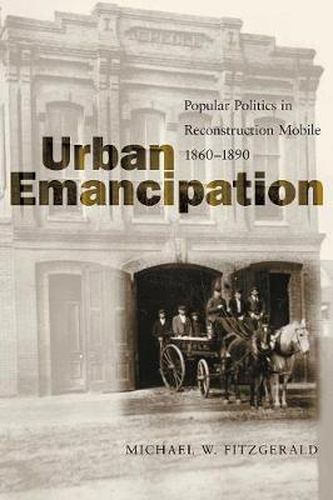Urban Emancipation: Popular Politics in Reconstruction Mobile, 1860-1890
Michael W. Fitzgerald

Urban Emancipation: Popular Politics in Reconstruction Mobile, 1860-1890
Michael W. Fitzgerald
This title is printed to order. This book may have been self-published. If so, we cannot guarantee the quality of the content. In the main most books will have gone through the editing process however some may not. We therefore suggest that you be aware of this before ordering this book. If in doubt check either the author or publisher’s details as we are unable to accept any returns unless they are faulty. Please contact us if you have any questions.
Scholars of Reconstruction have generally described Republican Party factional conflicts in racial terms, as if the Radical agenda evoked unified black support. As Michael W. Fitzgerald shows in the first major study of black popular politics in the urban South in the years surrounding the Civil War, that depiction oversimplifies a contentious and often overlooked intraracial dynamic. Republican political power, he argues, heightened divisions within the African American community, divisions that were ultimately a major factor in the failure of Reconstruction. In Mobile, the Confederacy’s fourth largest city, the most pressing social divide within the black community was between longtime residents - often freeborn prosperous, and of mixed ancestry - and the wave of destitute rural freedmen fleeing the countryside. After Emancipation, moderate African American leaders seeking legal equality emerged from the first group. The newcomes spawned a more militant faction who formed the constituency for the white carpetbag leadership that dominated popular Republican politics. Fitzgerald traces how the rivalry between these black factions yielded a startlingly antagonistic political scene that steadily escalated into physical conflict. Though Fitzgerald’s book examines the local level, its implications are far reaching. It demonstrates that the Republican factionalism that helped doom Reconstruction went beyond competing cliques of white officeholders. Blacks too were partially responsible for the failure of Reconstruction. Boldly challenging reigning theories about the nature of post-Civil War politics, Urban Emancipation will spark historical debate for years to come.
This item is not currently in-stock. It can be ordered online and is expected to ship in 7-14 days
Our stock data is updated periodically, and availability may change throughout the day for in-demand items. Please call the relevant shop for the most current stock information. Prices are subject to change without notice.
Sign in or become a Readings Member to add this title to a wishlist.


